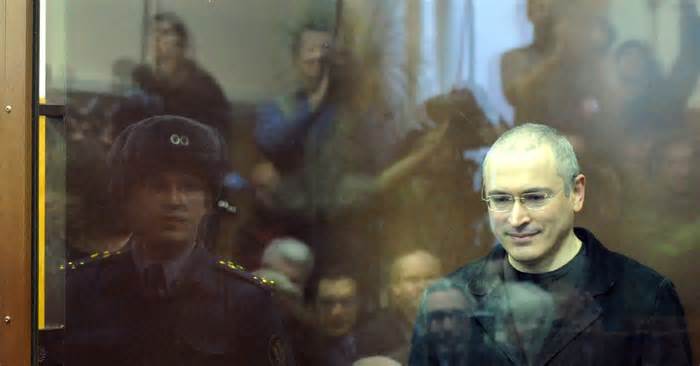Advertising
Supported by
A comprehensive documentary about Mikhail Khodorkovsky is a bit unsatisfactory.
Ben Kenigsberg
When you purchase a ticket for an independently reviewed film through our site, we earn an affiliate commission.
Condensing the career of Mikhail B. Khodorkovsky into a feature documentary was never going to be easy. The difficulty is not simply that Khodorkovsky has had a protean presence in Russian public life. An opportunist and eventual oligarch after the fall of the Soviet Union (he was the country’s richest man), he became a prominent critic of President Vladimir V. Putin and is now seen as a reformist voice.
The trouble is also that Khodorkovsky is tough to pin down. His answers aren’t always satisfying, and an overall assessment is tricky. A man who grew wealthy by exploiting Russians ignorant of capitalism in the early days of post-Soviet Russia — and became an energy tycoon after gaining control of an oil company in an auction widely perceived as rigged — can’t easily be pegged as a hero. A man who spent a decade in prison on charges that were seen by his allies as politically motivated, and who nevertheless seems devoted to changing Russia rather than relaxing in his exile in London, makes for a natural movie protagonist.
“Citizen K,” a profile from Alex Gibney in which Khodorkovsky is interviewed at length, doesn’t so much resolve Khodorkovsky’s contradictions as it reflects them. (The title, at once overblown and unimaginative in its evocation of “Citizen Kane,” offers a clue to the movie’s interest in shades of gray.) First and foremost, the documentary is a densely constructed primer on Russian power and politics from the early 1990s to the present. Gibney, signaling that he is aware of the unwieldy material, introduces important players in a cheeky, rapid-fire cast-of-characters montage near the beginning.
The film is at its best in its first half, which, through interviews and well-selected clips, charts Khodorkovsky’s rise through what Gibney, in narration, calls the “gangster capitalism” that pervaded Russia after the fall, and evokes the sense of confusion caused by the country’s transition to a free market. Khodorkovsky, who elsewhere compares the atmosphere to the Wild West, discusses buying monetary vouchers from the gullible for less than they were worth.
He cites a Russian saying: “The strictness of Russian laws is compensated for by the lack of obligation to follow them.” The film suggests that such ambiguities only compounded Khodorkovsky’s potential legal troubles once he became a Putin foe. Putin is portrayed as a low-level player in the K.G.B. who through ambition, a willingness to be all things to important people and a shrewd understanding of the news media managed to secure and hang on to power for two decades.
The second half, while never quite falling into hagiography, tends to iron out the first half’s ambiguities. We hear of how Khodorkovsky became a better man in prison and emerged as a popular dissident after Putin pardoned him in 2013, shortly before the Sochi Olympics. Whatever political ambitions Khodorkovsky now harbors are stymied by the risks he would face by entering the country — Russia filed murder charges against him in 2015 — and his tainted past as an economic predator.
Yet while Gibney’s refusal to simplify his subject, whom he clearly admires, is commendable, his attraction to Khodorkovsky’s story in particular remains elusive. Although the film has long, engaging stretches, there is something slightly unsatisfying about the whole. It leaves open the question of whether Gibney couldn’t figure out his subject — or whether the filmmaker, who says he began “Citizen K” because this is a time “when we all seem haunted by Russia’s role in the world,” never quite found his focus.
Citizen K
Not rated. In Russian and English, with English subtitles. Running time: 2 hours 6 minutes.
Advertising

Be the first to comment on "‘Citizen K’ Review: an Attempt to shoot down a Russian oligarch"